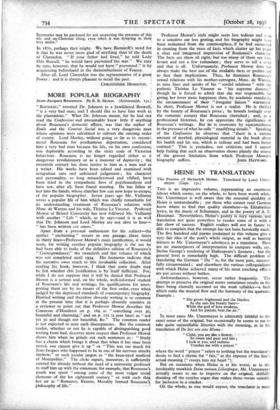ROUSSEAU," retorted Dr. -Johnson to a bewildered Boswell;
" is a very bad man, and I Shoidd like to haVe hini work in the plantations." What Dr. Johnson meant, for he had not- read the Confessions and presumably knew little if anything about Rousseau's domestid affairs, was that -the author of Emile and the Contrat Social was a very dangerous man whose opinions were calculated to subvert the existing order of society. Lord Morley, without going so far as to recom.:
mend Rousseau for posthumous deportation, • considered him. a very bad man because his life, on his own confession; was deplorable according to the strict code of Victorian
behaviour. Rousseau is no longer regarded either as dangerous revolutionary or as a .monster of depravity ; the twentieth century has done justice to him as a man and as a writer. His works . have been edited and examined .with
scrupulous care and unbiassed judgement ; . his character and personality, so long misunderstood and vilified, have been tried in the sympathetic fires of psychoanalysis and.
have not, after all, been found wanting. He has fallen at last into the hands, whose clutches few can now hope to escape; of the popular biographer. Seven years ago Mr. Vulliamy wrote a popular life of him which was chiefly remarkable fof its understanding treatment of Rousseau's relations with- Mme. de Warens and his wife, Therese Le Vasseur. Professok Mowat of Bristol University has now followed Mr: Vulliamy with another " Life " which, as he says—and it is as well that Dr. Johnson and Lord Morley are not • alive to hear--; " has been written con amore."
Apart .froin a .personal enthusiasm for his. subject—the
epithet " enchanting " occurs in one .passage:: _three times in thirty dines. Professor- Mowat's main justification, it would seem, for writing- another popular biography is the use he had been able to make of the definitive edition of Rousseau's " Correspondence;" the twentieth. and-last volume. of which was not completed until 1434. His footnotes indicate that
his narrative owes much to this invaluable collection. After
reading , his book, however; Y think that some doubt may be felt, whether this jusiffication is by itself' sbffiCiein. For; while I do not suppose that it will be denied that Professol Mowat is a serious and, on the whole, well-informed student of Rousseau's life and writings, his qualifications for. inter.. preting them are by no means of the first order, even when judged by the depressed standards of contemporary biography. Hurried writing and therefore slovenly writing is so common at the present time that it is perhaps absurdly .sensitive in a reviewer to point out that Professor Mowat describes the Comtesse d'Houdetot on p. 169 as " something over 3o,, beautiful and charming," and on p. 172 (a_year later) as "not Yet 3o and though not beautiful, &c." The common reader is not expected to note such discrepancies. But the common reader, whether or not he is capable of distinguishing good; writing from bad, deserves more respect than Professor Mowaf shows him when he grinds, out such sentences as : " Study has a charm which brings it about that when it has. once been tasted, one cannot give it up " or " This was too 'much foi Jean-Jacques who happened to be in one of his nervous attacks anyhow," or such jocular jargon as " the keen-eyed medico; of Montpellier." The cliche expert, moreover, is sufficiently catered for already without the need of a university professor to stuff him up with the statement, for example, that Rousseau's youth was spent " among some of the most vulgar social elements of the lax eighteenth century " or with such this hot air as " Romance, Reason, Morality formed Rousseau's philosophy of life." Professor Mowat's iiyle Might seem less tedious and c. en to a sensitive ear less grating, and his biography might have been redeemed from the commonplace, if he had succeeded in creating from the mass of facts which clutter up his pages a clear and integrated impression of Ronsseates character. The facts are there all right; but- too-many- of -them are irre- levant and not a few redundant ; they serve to tell a story and that is all. Unfortunately, Professor Mowat does not always make the best use of the available facts or prefers not to face their implications. Thus, he -dismisses Rousseau's sexual relations with his mother-surrogate, Mme. de Warens, in nine lines and speaks of his " sordid relations " with the pathetic Therese Le Vasseur as " his supreme disaster," though he is forced to admit that she was responsible for giving her lover more happiness than, by academic standards, the circumstances of their " irregular liaison '? warranted. In short, Professor Mowat is not a realist. He is thrilled by the beauty of Rousseau's prose ; he broods lovingly over the romantic scenery that Rousseau cherished ; and, as a professional historian, he' can appreciate the significance of Rousseau's writings. But he is overcome by squeamishness in the presence of what he calls " unedifying details." Speaking of the Confessions he observes that "there is a certain amount of morbid, physiological material in the book about his health and his sex, which is tedious and had been better _ omitted." This is prejudice, not criticism, and I cannot help feeling that such an observation shows plainly the source of the gravest limitation - from which Professor Mowat's
























































 Previous page
Previous page